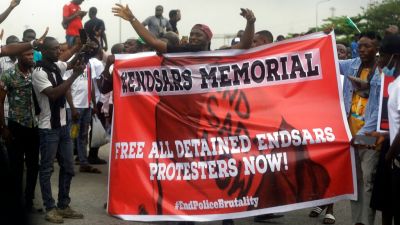Insight
What has changed one year since the Lekki toll gate tragedy in Nigeria?

Words by ITV News Deputy News Editor Lola Lawal
For many in Nigeria, Wednesday was an anniversary they would rather not have marked.
It was exactly a year since Nigerian soldiers opened fire on thousands of peaceful anti-police brutality protesters at the Lekki toll gate in Lagos.
Hundreds of people were severely injured and, according to Amnesty International, at least 12 civilians lost their lives that night, bringing the death toll since the start of the protests to more than 50.
There is, however, still no official death toll and many families say they are yet to locate the bodies of missing relatives who had been present at the toll gate.
Protesters gathered that day campaigning to end police brutality. Their focus was a unit called the Special Anti-Robbery Squad (SARS), which held a long running record of alleged abuse and corruption against its name.
With the hashtag #EndSARS becoming prominent on social media, the campaign had been running for years, but it gained a resurgence and global attention in 2020 with several UK celebrities such as Anthony Joshua and John Boyega voicing their support to demonstrators.
It was, in many ways, an uprising moment for Nigeria; young people took to the streets countless times to protest in unprecedented numbers and diaspora in other countries did the same.
For many involved, it seemed the world was finally listening to what they had to say, and maybe even their government too. This is why what happened at the Lekki Toll Gate on October 20 last year came as such a shocking blow to many in Nigeria.
But 12 months on from this harrowing event, what has changed?
The mood with many is certainly still sombre with hundreds of people cautiously gathering at the scene to commemorate the anniversary.
It was organised by Nigerian rapper Falz. The musician, who is a prominent supporter of the #EndSARS movement, claims he has also been a victim to police brutality on different occasions.
"There was one time that I was driving with my manager, and he was physically assaulted by a police officer. There are several stories. I can't start to recount.
'They're more than ordinary Nigerians to us - they're heroes'
"The memorial was very important because those people that we lost on that day, they're more than ordinary Nigerians to us - they're heroes. They sacrificed their very existence for this cause."
I spoke to one protester who was too "heartbroken" to attend.
George Uruakpe is a journalist who was filming the demonstrations at the Toll Gate when he heard gun shots. He still relives with horror what he witnessed that evening.
“At some point, the lights went off. I saw people drop. We saw people die. I tried to help those that were injured before fleeing to a nearby hotel, but others weren’t so lucky to get away. I spent the whole night crying, fearing for the worst.”
The Nigerian army does not take responsibility for the fatalities and a panel inquiry launched by the government into the incident has failed to hold anyone to account for the shootings.
For George, not enough is being done to get justice for the families of the victims.
“I still have a bloodstained flag with me to serve as a reminder. Nothing has changed. We are still being oppressed as if nothing happened that night.”
He is not the only one who holds this sentiment. Last year, ITV News spoke to Jide, a demonstrator who had been at a protesting in another part of Lagos. Months later, he is pessimistic about the progress that has been made.
“SARS has been disbanded but has any tangible change happened? People are still getting stopped by police based on how they look. I have a friend who was recently wrongly jailed by police based on false allegations. Police brutality still exists," he said.
One effect in the aftermath of the shooting was an increase in people turning to grassroot politics.
One man, who wishes to remain unidentified, explained to me how he has changed his job since last October to work for a government-related organisation. He says several of his friends have or are considering doing the same thing in a bid to affect the change they are all so desperate to see.
He said: “Last year, something broke in everyone. A childish hope died… It was a huge awakening of how bad the state of the country was and how we must protect ourselves.
"Since the start of the protests, I’ve seen some amazing work done by people in governmental agencies. We need more young people taking responsibility for our country from within these sorts of systems.”
Each conversation I have with protesters underlines the belief that the onus is on the next generation to step forward to fix Nigeria’s problem with police brutality.
While there is a strong sense of disillusionment and disappointment with the progress that been made in the last twelve months, there remains faint hope that real change will, even if painfully slowly, eventually occur.